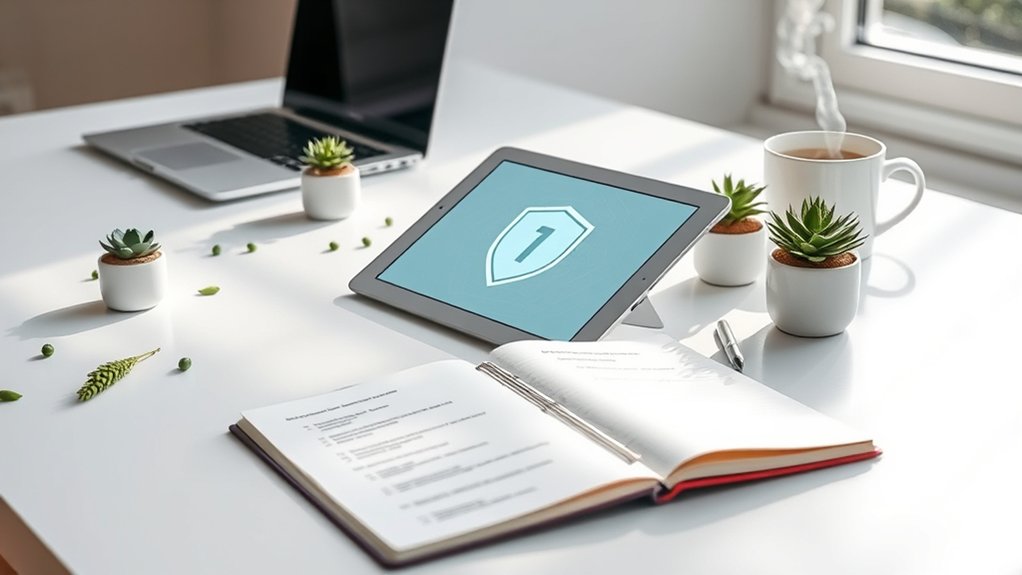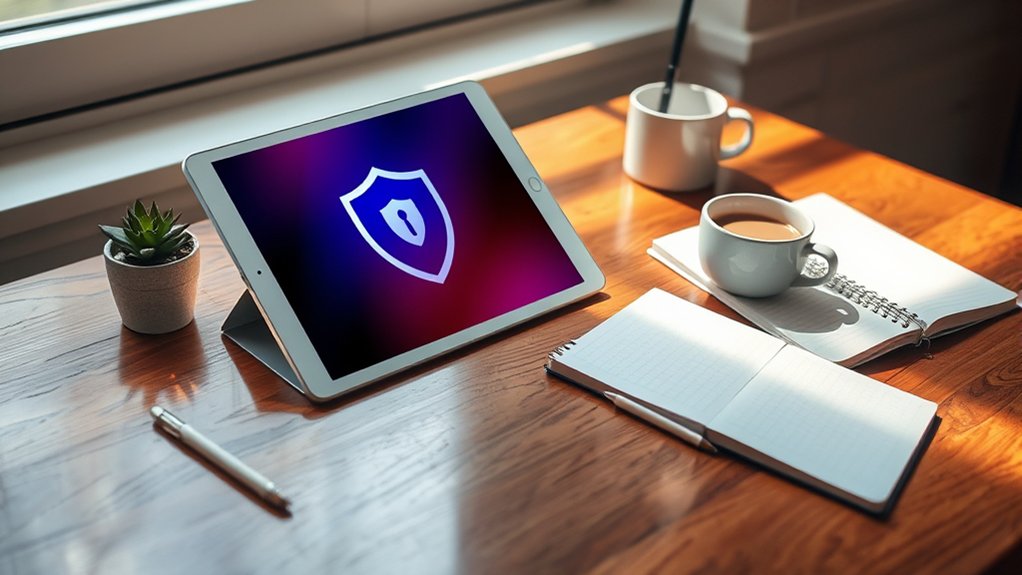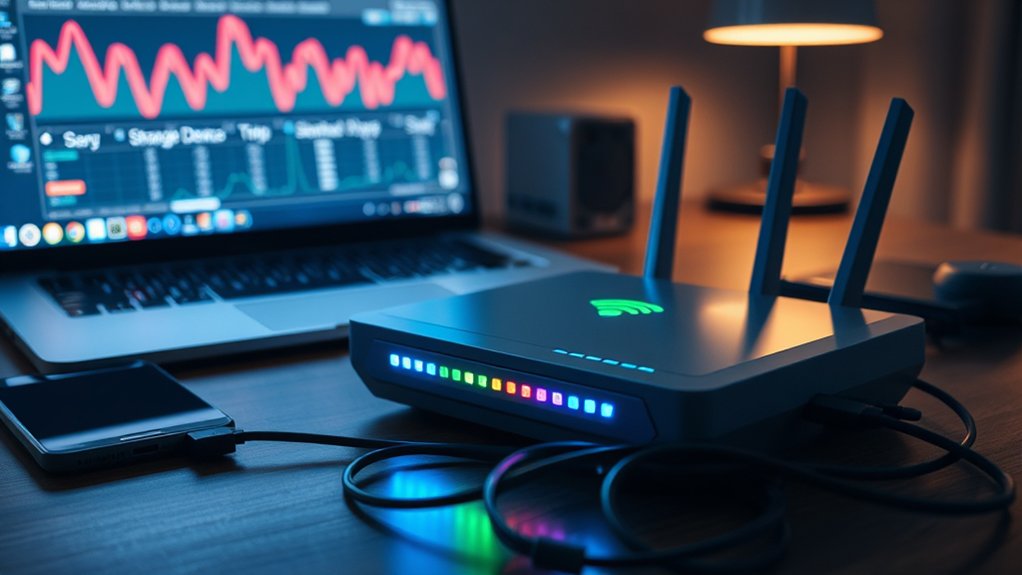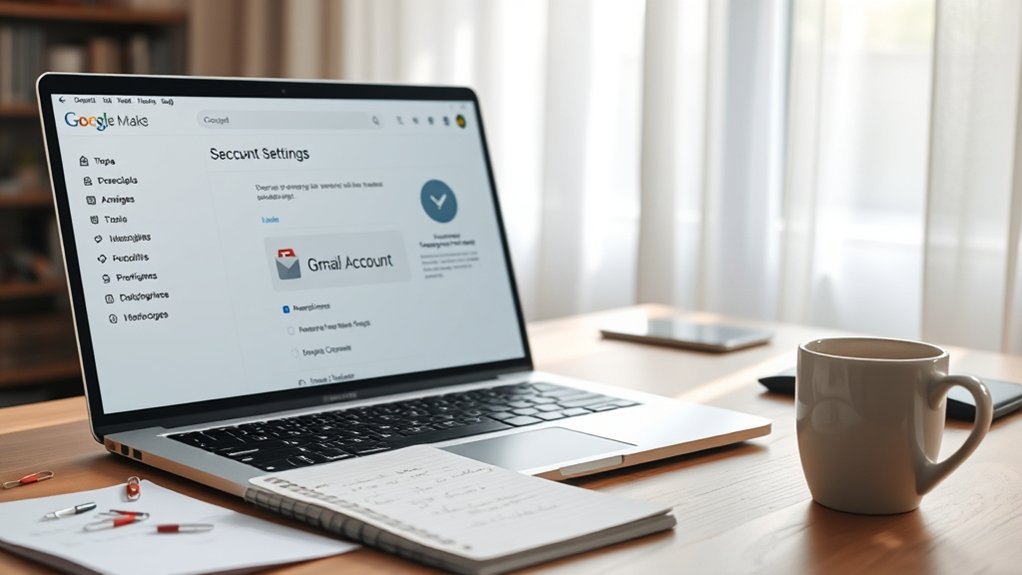To check an iPad for viruses, users should monitor for unusual pop-ups, performance drops, and unexpected app crashes. Increased data usage or rapid battery drain may likewise signal infections. Regularly reviewing and removing unfamiliar apps improves security. Downloading primarily from the official App Store and maintaining current software with security updates is vital. Users are advised to activate two-factor authentication and back up important data routinely. Further insights into effective malware prevention will follow.

Though iPads are known for their strong security features, concerns about malware persist among users. The closed iOS operating system, which limits the spread of viruses, provides a significant advantage in security. However, forms of malware such as trojans and spyware can infiltrate these devices, especially if they are jailbroken. This susceptibility highlights the need for users to adopt vigilant practices to guarantee device safety continuously.
Users may identify potential malware infections through specific symptoms. Unusual pop-ups, advertisements, and a noticeable decline in device performance often signal malicious activity. Furthermore, unexpected app crashes and unexpected data usage can indicate issues. Malicious software can drain a device’s battery faster than normal, further underscoring the need for regular monitoring of device behavior. [iPads are resistant to viruses due to the iOS compartmentalized operating system, where apps are isolated, making it nearly impossible for a virus to infect and spread within iOS.] It’s important to be aware that even with these security measures, certain types of malware can still pose risks.
Unusual pop-ups, app crashes, and rapid battery drain may signal potential malware infections on your device. Regular monitoring is essential for security.
Checking for malware necessitates proactive measures. Regular app reviews are crucial for identifying unfamiliar applications that might pose security risks. Clearing browsing history and website data helps mitigate threats from adware. Employing content blockers, such as 1Blocker, further reduces susceptibility to web-based attacks, highlighting the importance of an informed approach to security. iOS users must be cautious about malware threats stemming from malicious websites and unauthorized apps.
Preventive strategies are vital for iPad users. Downloading apps strictly from the official App Store minimizes malware risks and guarantees a safer user experience. Keeping both the device and apps updated with the latest security patches is essential for closing loopholes that malware could exploit. Enabling two-factor authentication adds an additional layer of security, whereas remaining cautious of phishing attempts is imperative for maintaining device integrity.
In instances of suspected malware presence, resetting the device to factory settings can effectively eliminate malware. Important data should be backed up prior to resetting, preserving information integrity.
Ultimately, maintaining a consistent routine of data backups and regular reviews can greatly increase security and reduce vulnerabilities on iPads, reinforcing an overarching commitment to cybersecurity.
Frequently Asked Questions
Can I Get a Virus on My Ipad?
The possibility of obtaining a virus on an iPad is minimal because of its iOS architecture, which inherently resists traditional viruses.
Nevertheless, threats such as malware and spyware can emerge, particularly from jailbroken devices or risky downloads.
Experts warn that signs like excessive pop-up ads, rapid battery drain, or unfamiliar apps may indicate an infection.
Maintaining regular security updates and avoiding jailbreaking are essential preventative measures against these vulnerabilities.
What Symptoms Indicate My Ipad May Have a Virus?
Symptoms indicating an iPad may have a virus include notable performance issues, such as reduced speed and rapid battery drain. Users might observe unusual app activity, like unfamiliar applications appearing unexpectedly or increased pop-up advertisements during browsing.
Moreover, excessive data usage and unusual network behavior may signal potential malware. Signs like unexpected notifications and changes in browsing history further corroborate a compromised device. Such anomalies require thorough inspection and potential remediation to guarantee device integrity.
Are There Antivirus Apps Recommended for Ipads?
Numerous antivirus applications are recommended for iPads, enhancing security against various threats.
Norton offers strong parental controls, whereas McAfee includes identity protection and VPN services.
Avast stands out with free antivirus options and webcam protection.
TotalAV, though primarily focused on iPhones, provides substantial security features.
Avira is privacy-centric but less frequently suggested for iPads.
Selecting the appropriate app involves considering cost, compatibility with iOS, user experience, and additional features for maximum protection.
How Often Should I Check My Ipad for Viruses?
The frequency of checks for viruses on an iPad is not as crucial as on other devices because of iOS’s inherent security features.
Experts recommend monthly reviews of settings and performance to detect issues. Regular software updates are vital, as they address security vulnerabilities.
In cases of suspicious behavior, such as excessive pop-ups or lagging, immediate troubleshooting is advised.
Consequently, although daily checks are unnecessary, vigilance remains paramount for maintaining device integrity.
Is Resetting My Ipad Safe for Removing Viruses?
Resetting an iPad is considered a reliable method for removing viruses, particularly when other options fail. According to experts, a factory reset eradicates all content, including malware, thereby providing a clean start.
Nevertheless, this irreversible action must be approached with caution—backups should be carefully managed, especially if malware is suspected.
Regularly updating the iOS post-reset improves security further, making this procedure a significant consideration for iPad owners concerned about potential virus infections.









